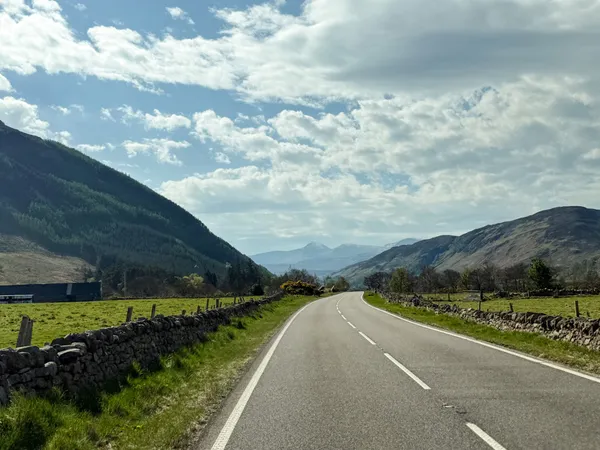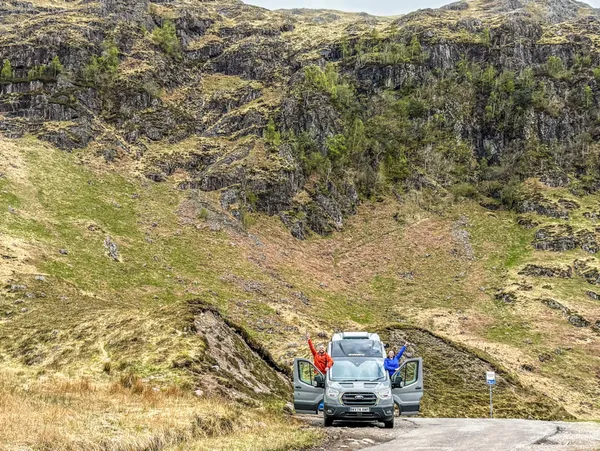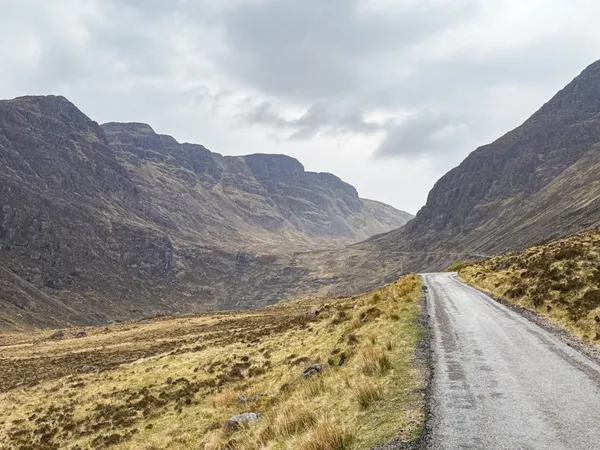Information for caravans and motorhomes
Some need-to-knows!
Traveling the NC500 with a caravan or motorhome is an incredible way to explore Scotland’s rugged beauty at your own pace, but it comes with some important considerations to keep in mind!
Traveling by caravan or motorhome offers freedom and flexibility on the NC500, but a bit of planning goes a long way to ensuring a smooth and enjoyable adventure.
Road Access Limitations:
Not all roads along the NC500 are suitable or accessible for caravans and larger motorhomes.Some routes have low bridges, narrow lanes or sharp bends that make navigation difficult or even impossible for longer vehicles.
Before you set out, please check your route carefully and consult local advice or maps that indicate vehicle restrictions! In some cases, alternative routes or detours may be necessary.

NC500 Road Sections Not Suitable for Caravans & Large Motorhomes:
Correct at the time of writing, please do your research before you travel.
Bealach na Bà (Applecross Pass):
This is probably the most famous stretch to avoid with a caravan or large motorhome. The road is extremely narrow, steep and has hairpin bends that require experienced driving. It’s a single-track mountain pass with no passing places wide enough for bigger vehicles, making it unsuitable and dangerous for towing or large rigs.North Coast 500 Northern Loops (Between Durness & Tongue):
Some of the coastal roads here are narrow and winding, with few passing places and tight corners. While not always officially restricted, these roads can be difficult for long vehicles to navigate safely.Melvich to Tongue (A836 and minor roads):
Although A836 is a main road, some adjacent minor roads or detours here can be very narrow and are not recommended for caravans.Some Single-Track Roads West of Ullapool:
Minor single-track roads heading west towards remote beaches and lochs often have passing places but can be challenging with larger vehicles.Roads
The NC500 features many narrow, single-track roads with passing places and tight bends, especially on the more remote western and northern sections.
If you are hiring a motorhome, it’s essential to practice reversing and be comfortable driving on the left-hand side.
Parking & Overnight Stays:
Not all campsites and accommodations can accommodate larger vehicles, so always book in advance and confirm vehicle size limits.Wild camping in motorhomes is not legally permitted in Scotland and free overnight parking spots often come with strict rules such as no awnings and no outdoor cooking or seating.
Be respectful of local communities - there have been incidents of tensions in popular spots between locals and tourists.
Apps like Park4night can help you find approved motorhome-friendly spots.
See our travel tip on free overnight parking for more info!
Campsite Facilities:
Many campsites along the NC500 offer full hook-ups, including electricity, fresh water and waste disposal.Facilities can be basic or limited in remote areas, so plan your stops accordingly.
Fill up with water and empty waste tanks regularly, as services are sometimes limited between towns.

Fuel Stops:
Diesel or petrol stations suitable for larger vehicles aren’t always frequent along the route, especially on the west coast and northern stretches.Fill up whenever you get the chance to avoid running low.
Also, keep an eye on fuel consumption as towing a caravan or driving a motorhome can use more fuel than a standard car.
A friendly reminder. Respect Local Rules & Environment:
Remember to follow the Scottish Outdoor Access Code and local guidelines for responsible camping and parking.Leave no trace, respect wildlife and be considerate to residents and other travellers.
Want to see more?
I have created curated maps, itineraries and more for travellers that want to travel like me.
Looking for things to do?
Go check out my guide for the best free things to do as well as itineraries and travel tips to make your trip unforgettable.


